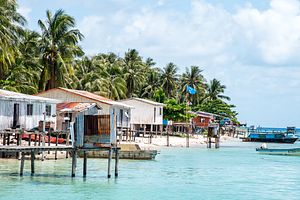It’s a dark night, the moon providing little illumination on the unusual procession making its way along a pristine beach on a remote island in Malaysian Borneo. Our guide and local wildlife warden, Absan Saman, pauses occasionally, searching for clues in minor indentations in the sand or behind the crowded treeline.
Tailing behind, trudging in pairs with M16s firmly gripped in their hands, a police escort follows on what seems a tame mission. Their presence is a necessity in the piracy-stricken region. Joining tonight and taking up the rear are Saman’s mentors from the World Wide Fund for Nature (WWF).
This is Saman’s nightly ritual. Starting at 9 p.m. and normally finishing just before dawn, he searches for a treasure that has become an increasingly rare sight — nesting sea turtles.
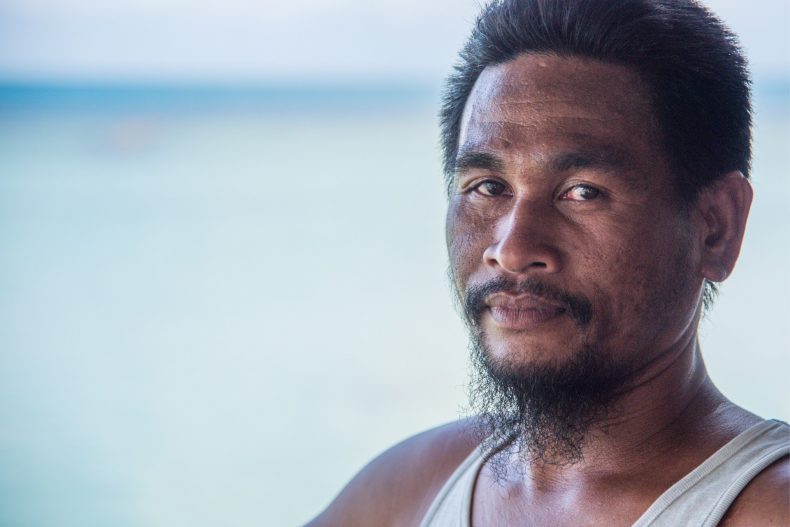
Honorary Wildlife Warden, Absan Saman, patrols the beaches of Tigabu every night racing the poachers to turtle nests. Photo by Ben Blackledge.
****
Tigabu Island is just one of many in an archipelago situated 150 kilometers north of the region’s capital, Kota Kinabalu. The surrounding area received protected status and was gazetted in May 2016 as Tun Mustapha marine park. Measuring over 1 million hectares, Tun Mustapha is the largest such park in Malaysia and is jointly managed through collaboration between the government authority, Sabah Parks, NGOs, and local communities.
Joannie Jomitol, WWF senior program officer based in the local town of Kudat, lists the myriad of issues the park is facing: over-fishing, use of destructive techniques like cyanide or bombing, habitat destruction, and poaching amongst others.
Protecting such a large area requires a collaborative approach, explains Jomitol. “It is a special park because this is the first park that’s [been designated] multi-use. [There are] more than 80,000 people living on the coastline dependent on the marine resources so we cannot simply close the park. We must take into consideration the livelihoods of these people.”
The multi-use model breaks the park into zones to restrict fishing activity and allow reef regeneration; some are for community fishing, others commercial, and some are designated as completely off limits.
But introducing limits on fishing for communities of subsistence fishermen creates problems if the objectives are not fully understood. Multiple sources confirm the marine park is still a source of contention and estimate that around half the population are for, half against, splitting some communities down the middle.
To replace this loss of income, the WWF promotes “alternative livelihoods,” giving training and support to locals who are trying to diversify their sources of income, from sea cucumber production to eco-farming and tourism.
“The key is information,” explains Jomitol. “I’m sure not many people understand [about] the park, what it does. When they don’t understand what the benefit is to them… they will resist.”
Jomitol’s message to the villagers: “The park is not meant to destroy you, but to build you from within.”
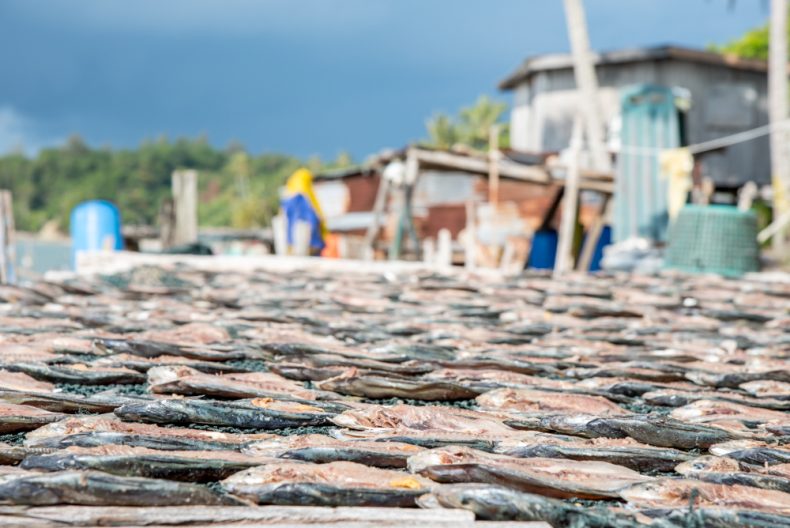
The families of Tigabu and Balambangan until recently lived subsistence lifestyles relying on the sea to provide most of their necessities. Photo by Ben Blackledge.
****
Tun Mustapha lies within the rich waters of the Coral Triangle, an area stretching between the Philippines in the north, Java in the west and the Solomon Islands in the east. The Nature Conservancy, a multinational charity that raises conservation issues across Asia, asserts the conservational importance of the area and considers it a “global epicenter of marine biodiversity.”
The triangle contains the highest biodiversity of coral (76 percent) and reef fish (37 percent) found anywhere in the world. The Tun Mustapha Expedition Report, published in 2012 by the WWF, found 252 species of hard coral and 350 species of fish as well as migratory species such as dugong, whale shark and the endangered green turtle. Every year the importance of conservation is highlighted by discoveries of discarded turtle carcasses, most notably in 2015 when 19 were found on Palau Tiga in one night, thought to have been abandoned in a botched poaching operation.
****
Saman freely admits that decades ago, like many others, he would fish-bomb the reef off Tigabu. He recalls “[In the 1990s] if we go out to the sea for two or three days, the catch can support two or three months of expenses, but now if you go out for one month it won’t cover one month’s expenses because the fish stock is depleted.” Thinking of his children began to change his perception, “If I continue to bomb, I will kill all the small fish and then the small ones will not be able to grow big. I want my children to get big fish too.”
When the WWF came to the village in 2009, the idea of taking care of marine life came more naturally to Saman, who had raised animals as a child, than others. The WWF provided training including an internship at nearby “Turtle Island” in Sandakan, a turtle reserve off the coast of Sandakan.
Now qualified as an Honorary Wildlife Warden with Sabah Parks, Saman spends his nights patrolling local beaches for turtles nests, racing poachers who take the eggs for a source of food. If a poacher finds the eggs first, there’s little Saman can do. In a small community these poachers may be friends or family — for his safety, he has to avoid confrontation.
When he finds a nest, he’ll carefully transfer the eggs to a secure hatchery where they can incubate in safety. On hatching, Saman organizes informational events to teach the other villagers about the value of conserving their marine life. There are fledgling signs that the community is becoming aware of importance of conservation: Last year he received a phone call from a poacher offering him a share of a turtle nest they discovered in recognition of his efforts.
****
Despite these successes, the logistics of informing and correcting misconceptions across 1 million hectares and over 80,000 people present a challenge to the WWF.
British owner of eco-guesthouse Tampat Do Aman, Howard Stanton, thinks it’s an information issue, “Different groups as a whole could do a lot more to listen and explain. They need to get onboard because, if they say no, it’s their back garden. It’s just gonna end up a right mess again.”
Stanton empathizes with local villagers who don’t understand why their fishing is being restricted. “It’s their livelihood, that’s their food. You tell a local fella, ‘Your families have been fishing in these local areas for the last 200-odd years and now [you] can’t go there. [They’ll be] frightened of the authoritarianism, of what could happen. You’ve got to feed your kids.”
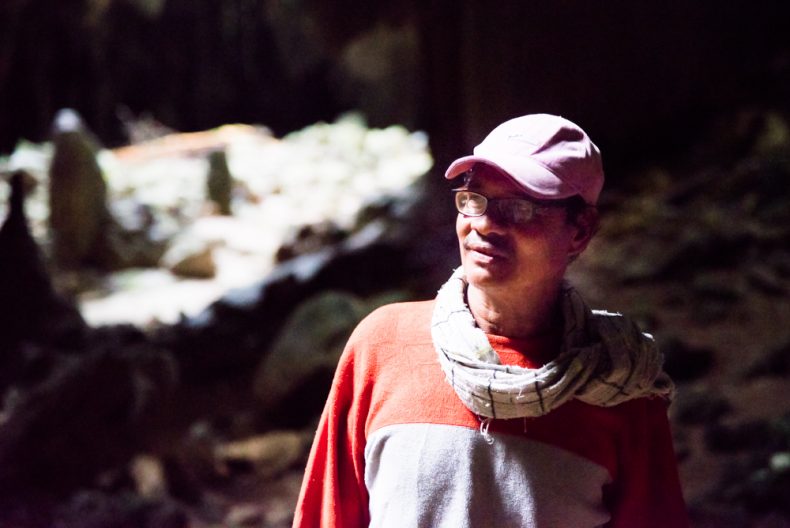
Akbari Bin Jikirun, an eco-farmer on Balambangan island, hopes that nearby caves will become a major tourist attraction supplementing their fishing income. Photo by Ben Blackledge.
****
On nearby Balambangan Island, the WWF found inspiration through a gentle soul within the local community. When Suriah Binti Taha, fondly known as “Aunty Suriah,” saw the plummeting fish stocks, she felt there must be more they could do. As an avid gardener, Taha rallied the women of the village and reached out to the WWF, showing them the bountiful crops in her backyard.
In April 2016, the WWF funded internships in Kota Kinabalu for members of the community, including Taha’s son, and provided them with everything they would need to begin: fences, water tanks, and seeds. Then they stepped back. Within months the community was growing a variety of crops from cassava (the source of tapioca) to pineapple — now there are three farms up and running, with the concept fast spreading to other villages.
Taha’s husband, Akbari Bin Jikirun, quickly saw the benefit of eco-farming over fishing, “Before I could get baskets of fish. Now, I can get only two or three in one night,” he says. “Eco-farming is more sustainable than going out fishing because, with an eco-farm, you can build it up… whereas if you go fishing you’ll most likely use fish bombs and that is not sustainable for nature.”
Suaib Bin Seleh, known locally as “Rambo,” a nickname from his previous job guarding fish farms armed with “no gun, just a mouth,” ran one of the most successful enterprises before his wife fell ill. Returning to his farm after months, he surveys a state of disrepair which will take weeks of hard work to recover.
It’s a difficult occupation — at least once a year the crops will be decimated by drought or floods. But, during the peak months, each farm can make up to 700 Malaysian ringgit ($175) every month— a profitable venture when compared to a typical fisherman’s salary of 400 ringgit.
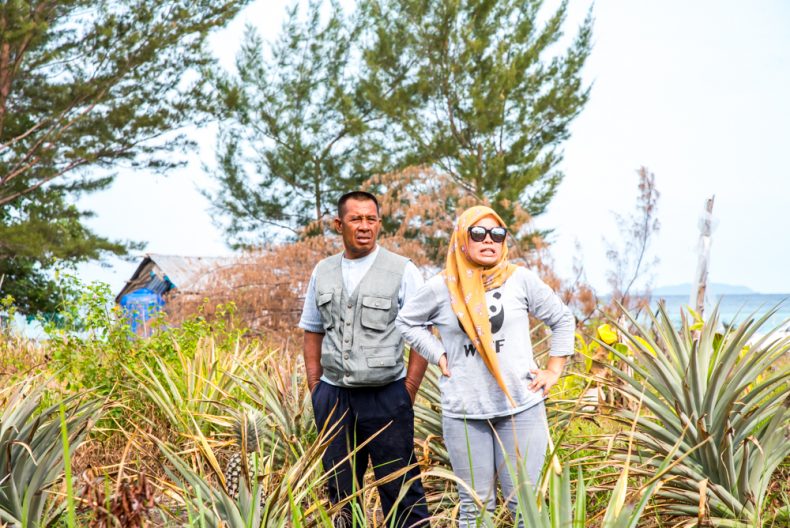
‘Rambo’ and WWF contact, Sharmalin Sakirun, survey his eco-farm after several months away from the island. The farms are routinely damaged by monsoon flooding and droughts. Photo by Ben Blackledge.
****
There are tentative signs that the efforts of Saman and his fellow wardens will be rewarded but, as with all community-based conservation, it’s a process that cannot be forced. The flow of information is key — if the locals understand the long-term benefits, they may be more accepting of the inconvenience they bestow.
In the future, Jomitol sees a transformed Tun Mustapha, one which provides shelter and protection not only for the exquisite marine life found within its boundaries but for its human custodians, “When everything is in place, they’ll be no more fish-bombing, the fisheries will be sustainable, the communities will be getting a good supply and so the poverty level [will go] down…” she says.
“We’d like to see the ecosystems thriving, the coral reef resilient, and communities resilient to what’s to come.”
Ben Blackledge is a freelance journalist based in Hong Kong













